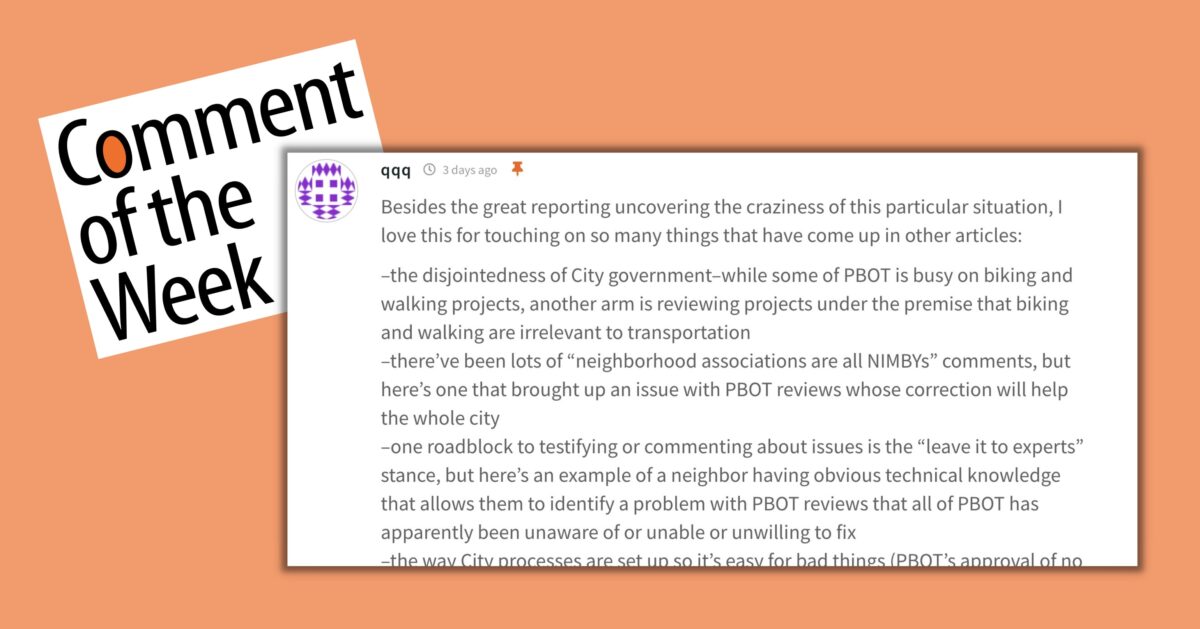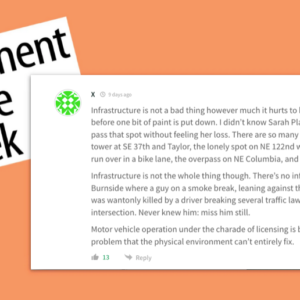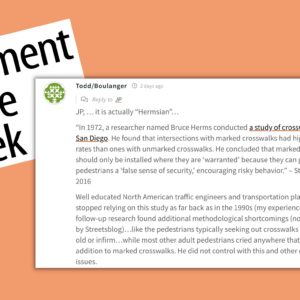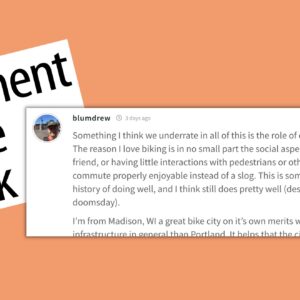Welcome to the Comment of the Week, where we highlight good comments in order to inspire more of them. You can help us choose our next one by replying with “comment of the week” to any comment you think deserves recognition. Please note: These selections are not endorsements.
Given that it delved into policy, last week’s story about the struggle to get a sidewalk built on SW Gibbs Street (Traffic impact studies: shouldn’t pedestrians and cyclists count?), got a surprising number of comments. Many readers weighed in with relevant insights.
But only one commenter went “meta.” qqq read the story, in part, as a response to long-running debates in the BikePortland comments section. What a good reader! And who’s to say what the author was thinking.
Here’s what qqq wrote:
Besides the great reporting uncovering the craziness of this particular situation, I love this for touching on so many things that have come up in other articles:
–the disjointedness of City government — while some of PBOT is busy on biking and walking projects, another arm is reviewing projects under the premise that biking and walking are irrelevant to transportation
–there’ve been lots of “neighborhood associations are all NIMBYs” comments, but here’s one that brought up an issue with PBOT reviews whose correction will help the whole city
–one roadblock to testifying or commenting about issues is the “leave it to experts” stance, but here’s an example of a neighbor having obvious technical knowledge that allows them to identify a problem with PBOT reviews that all of PBOT has apparently been unaware of or unable or unwilling to fix
–the way City processes are set up so it’s easy for bad things (PBOT’s approval of no sidewalks) to slip through unless it — almost by chance — gets noticed by a neighbor or someone outside the review process who knows how to object
This line from the article really sums it up well:
“It is difficult to understand why the fate of transportation infrastructure near this economic engine depends on conversations between a PBOT middle-manager and a neighborhood volunteer.”
Thank you qqq! You can find qqq’s comment, and many other informative comments too, under the original post.








Thanks for reading.
BikePortland has served this community with independent community journalism since 2005. We rely on subscriptions from readers like you to survive. Your financial support is vital in keeping this valuable resource alive and well.
Please subscribe today to strengthen and expand our work.
I always love reading qqq’s comments; even when I disagree with them they always provide interesting insight and argue their points effectively.
We are lucky to have a public that has a range of expertise and wants to make the city better. In the past, the bureaus worked more effectively with the public, and as a result, in many cases we got better outcomes.
I can’t wait for the utopia of having all our important decisions made by an unaccountable city bureacracy run by a non-elected and unaccountable city manager.
Meanwhile, the commissioners are in charge. Here’s a quote from Mingus Mapps, PBOT commissioner, in a BP interview:
“I think cycling is part of the solution. We’re moving towards a different future and a different kind of city. And one of the important things is that our city needs to be resilient. We can have an earthquake, we can have a pandemic, public transportation can get shut down; so having a way for people to move around without burning gas is incredibly important. Cycling is also just really great for individual health. I’ve been on my bicycle a lot less over the past 18 months and I can literally feel it in my body and in my soul. So I think you have a healthier, happier city when you have more people cycling.”
Mapps didn’t address walking–it didn’t come up in the interview. Still there’s a lot to agree with, and work with, in there. This is a person who could really get their teeth into the Gibbs Street debacle. The PBOT Commissioner has pretty broad power over this situation and the people who have created it.
Our last mayoral election came down to a the incumbent who had led the city down the path to hell over the last four years and had to use his trust fund to run his campaign vs someone who couldn’t articulate basic city functions and lived on Twitter.
The qualities of a politician usually aren’t the same qualities of a good manager. The city of Portland is already unaccountable to the public. Way more than any other city I’ve ever lived in. Huge swaths of the city have zero representation in the government.
A city manager will be far far far more accountable than a Mayor. I can’t wait to have people who actually know something about transporation in charge of PBOT instead of whatever politician gets thrown in there.
Your strawman requires a brief dialog
bp commentator: Do you oppose an unelected city manager?
the city manager will save us: Yes
bp commentator: You must support Mayors and, specifically, Mayor Edward Tevis.
the city manager will save us: I oppose mayors too
bp commentator: how could the city function without a manager/mayor being in charge?
the city manager will save us: democratic self-governance is possible
Have you ever lived on a commune? Know anyone who has? I do. Self-governance barely works with 20 people. Suggesting that pure democracy would work in a city of 700k people is quite frankly unserious.
Have you ever traveled outside of the USA?
Resident-led assemblies and initiatives play a critical decision making role (and in many cases budgetary role) in many municipalities. For example, barcelona did not get its superblocks, superillas, many new bike lanes, and car-free zones because some city bureaucrat decided to take a risk.
Except, it’s not as simple as you make it seem. The earliest iterations of Barcelona superblocks were the result of an extensive public involvement campaign (which dragged on way too long and got bogged down). But later superblock installations, such as the Poblenou superblock, were very much created in a top down approach that looked a lot more like guerilla urbanism than a consensus building, community led project.
There was more than a decade between the installation of the first superblock and the next couple of superblocks, and then more than a decade before the fourth superblock (Poblenou) was installed. After the success of Poblenou, community support for additional superblocks grew widely. But prior to that, the community was skeptical.
It was an act of bold, visionary leadership that kicked off the current wave of less car-centric urbanism in Barcelona. It was not citizen assmeblies that made it happen, it was a mayor that empowered bureaucrats to take decisive steps quickly, and without excessive navel gazing.
https://www.vox.com/energy-and-environment/2019/4/9/18273894/barcelona-urban-planning-superblocks-poblenou
I mean, I’m not sure if you are serious, but Barcelona has a city council like we will, and that city council elects a strong mayor, much like our city council will hire a city manager.
Are you under the impression that Barcelona is led by resident-led assemblies? You understand that running Barcelona is done by professionals right?
Accountable to whom? Appointed people are always more insulated from the public than elected officials.
And who do you think is going to run PBOT? Tara Wasiak is doing it now, and I wouldn’t be surprised if Tara Wasiak is still doing it after the transition.
How are people who literally can’t be fired less insulated than people who can be fired on the spot? Both Dan Ryan and Ted Wheeler have done terrible jobs. Yet both won re-election because the left-wing money went to complete non-starter candidates. Hardesty was “held accountable” for Ted Wheeler’s terrible job as Police Commissioner. It’s all nonsense. Most people have absolutely no idea how the city works or how to gauge the job performance of city councilors.
A professional! The big change for me is that instead of calling Mingus Mapps, who doesn’t care what I think, I can call my representative who actually lives somewhat near me and experiences the same problems and ask them to take action.
The new structure will also, in my opinion, make it harder for PBA, PPA, Street Trust, and all the other organizations that have funded the candidates who have destroyed the city to buy seats as they have in the past. Our city has been controlled by the West Hills and Central City for its entire history. This is going to change that.
Mingus Mapps is likely as not to run for a seat on the newly constituted City Council. He’s got a lot on his plate with PBOT, the Water Bureau, and BES. What he does with that portfolio may have a lot to do with his chances running in a district against people with less of a record.
Of course he may just choose to keep his head down. It might be hard to effect change working with a large professional staff and a lot of union employees. Most of those people will still be there when Mapps and his peers are long gone.
Your representative, if they care about you at all, and who may not live anywhere near you, will have no control over the city manager, so good luck with that. Your best hope will be that they have developed some sort of informal personal relationship with the manager or the bureau heads and can get some leverage that way.
Right now you’ve got a much more direct line of control over the bureaus, and they still do whatever they want. It’s only going to get worse when lines of authority become more diffuse.
As for who can and cannot be “fired on the spot” (as if this were a thing), nothing is changing except for the insertion of another layer of insulation into the chain of accountability.
None of the current city council lives within 80 blocks of me. I’m not sure there are been a councilor from the peninsula in recent memory. Unless they go extremem gerrymander, there will be 3 councilors who live at least somewhat close to me both physically and economically. All five of them lived west of the river until Hardesty broke that up. Now all five of them live in the affluent central city.
Unless the city manager is going to be hired by a phantom and I missed that, the city council will have far more control over a city manager than we do a mayor.
Not true in the slightest. I’m guessing you live in an affluent part of town. Up here, they truly don’t care. I think that epitomizes the debate though. People who had great access to the city due to affluence and neighborhood status are going to lose power slightly under the change and people who have been locked out of the government (east portland, the peninsula, deep SE) are going to gain access.
That’s not how it plays out in other cities, of which there are many, that have a city manager.
Oregon is an at will state, so it is.
We’ll see. I don’t think you’ve really shown how there is less accountability. You just kind of keep saying it. We live in a zero accountability system already. When I call up my representative in the House (federal and state), they get back to me. When I call up the city, there is an almost zero chance I’ll hear back from them much more they’ll actually help solve my problem. I’ve already had lots of good experiences with have representation.
Of course, there are lots of other good things about this system, much more than accountability. The governmental change is the only bright thing that’s happened to the city in the last five years, try and enjoy it.
You are comparing different things: your ability to elect or recall the mayor has little relationship to how much power an individual member of city council will have over the city manager (which will be essentially zero).
For all the hoopla, the structure of power isn’t going to change that much; today it is city council (setting budget and general direction) with one individual council member being more directly involved -> appointed bureau head -> bureau. Tomorrow it will be city council (setting budget and general direction) -> appointed city manager -> appointed bureau head -> bureau.
Today if you want to influence a particular decision, you call a council member’s office, and they may or may not help. Tomorrow if you want to influence that decision, you can still call a council member’s office, but they will have no power to help unless they want to act formally via the entire council.
If you’re frustrated today, you’re going to be frustrated tomorrow. Probably more so because you have such high hopes for this change.
You are aware that we effectively had a city manager during most of the first year of Wheeler’s administration, right? Did things really work better then?
It’ll actually be 8.3% of the city council or 15% of simple majority.
So nothing is really going to change but everything will get worse by shifting to a common form of government?
Well, to be actually accurate, today it is 5 at large city councilors, all who are patrons and funded by the same organizations, with one of those five chosen at random to lead a bureau and set its budget and priorities over a hired bureau head.
Tomorrow it will be 12, geographically and most likely politically diverse city councilors over a hired/fireable professional city manager who will run the city like a coherent organization rather than tribes competing for money and prestige.
I don’t have the money I need to get them to call me back, so they do not help me.
Great! That system works really well actually! Literally how most cities function. When I call my representative in Congress, they also can’t act unilaterally. They can and do work on my behalf though. They can introduce bills I care about. They can form coalitions and try and solve problems I care about. The city councilor in charge of any one Bureau might have a completely different slate in two years. They aren’t accomplishing anything.
Portland is rock bottom. Nothing about our system works. The system we are moving to is used all throughout the country with success.
It literally can’t get any worse. I’m not concerned about Portland adopting a system used successfully all across the world.
That is incorrect. Outside of that, I think the combination of a city manager and real representation for most of the city is what matters. We could hire a city manager tomorrow and the city council would still make things worse.
Maybe you’re right: 4 irredeemably corrupt city councilors we have now vs the 12 wise and responsive (and diverse!) leaders we’ll get; an antiquated and benighted form of oversight now vs. the enlightened and benevolent leadership of a skilled city manager in the future; literally nothing working now vs. everything working with the new system. We face a glorious future; maybe I’ve been too cynical.
I bet PBOT will start getting all their gravel picked up within 48 hours, and Parks will replace all its lampposts when the new city manager gets installed.
I want to repeat, the style of government we are going to is both widespread and far more successful than our system.
I’m still not sure why you think the new system is going to be worse. I understand why Mapps and the Portland Business Alliance think this is going to be worse, but you seem to think you have access to the city council, which you might. I don’t know who you are. If you live in an affluent part of town you will lose some of your access, because instead of being be catered to by all five electeds, you’ll only have access to 3 or 12.
My neighborhood has zero access to the government. They don’t live here. They don’t visit here. They don’t recreate here. They don’t have friends here. This at least will force a quarter of the city council to live somewhat close to my neighborhood.
Will the new city council be perfect? Of course not. Will organizations like the PPA/PBA and the Street Trust have far too much influence in the government? Of course. Is it harder to bribe 12 people than 5? Yes.
Every single election I’ve voted in Portland, it’s always a choice between who I dislike least. That’s how it is for most people. The new system allows people to vote for who they want without throwing away a vote. If we had ranked-choice voting, we’d almost certainly have Vadim rather than Rene, which a lot of people on both sides would be happy about rather than one side completely losing out on governance.
Ted Wheeler is not a smart man. Ted Wheeler had to use his trust fund to get re-elected. We are helmed by someone so painfully incompetent, he’s got to be one of the least popular mayors in the country.
You’d take Ted over someone who has an actual resume of success? Someone who has proven they can run a large organization? Someone who can be fired (despite your incorrect assumptions) if they don’t perform?
You should take a trip down to Eugene. They are recovering from the pandemic nicely. They have tons of new bike infrastructure, their parks are clean, they’ve built shelter sites for the homeless with amenities. They have a city manager who manages it all. We will too.
“I’m still not sure why you think the new system is going to be worse. ”
I think the new system will be less accountable, as it further insulates bureaucrats from political actors. This is indisputable. I think that will create a system less responsive to the public. Whether you think this is good or bad may depend on whether you think government should be responsive or whether you’d prefer officials to push things forward regardless of what people want. My values firmly align with democracy.
I know you think your concerns are ignored because you don’t live in an affluent part of town, but most of the time I’ve asked a commissioner for help, they haven’t known where I live or what I earn. Maybe they helped me less than they would have otherwise, but I’m pretty attuned to politics, and I’ve never got that feeling.
You also talk about “bribery”, by which I assume you mean the influence of money on politics. I think the new electoral system will favor incumbents and early money even more than today’s system does, due to larger candidate pools and the low bar for getting elected. The mechanism seems obvious to me, and others have made similar observations, but we’ll have to see.
These are some of the reasons I think the new system will be worse. I don’t think it will be dramatically so, because our fundamental problem is that we face a number of intractable issues, and they’re going to remain intractable regardless of whether we have a city manager or not.
Many of the arm-chair commentators posting here have never interacted much with bureau staff and have absolutely no idea how much of the lethargy, foot dragging, resistance to change, and conservatism in city government is a direct result of the white collar fiefdom that dominates city bureaus.
cc_rider with the new comment of the week!
If the city was functioning at any level, this type of stuff would lead to people getting fired and replaced with competent leaders.
I think a lot of “this type of stuff” is systemic and hard to attribute to individual “leaders” subject to termination. In this case, it’s a policy issue subject to determinations by policy makers. What is needed is a flexible, interactive system so that policy issues can be identified and policies readily modified.
I live in a city that is governed by a weak city council and a strong city manager. You will absolutely love it:
Because if you don’t love it, you can always leave town.
Congratulations, you just described how Portland currently operates.
The fact that you think this is some sort of gotcha is a perfect example of how the reactionary liberal can’t fathom politics outside of a narrow Overton window. The choice is always between the status quo (created by a previous iteration of reactionary liberalism) or some insipid reform that allows liberals to claim to care about “equity” without actually addressing the chronic festering wounds of inequality in this metro region.
I agree with you soren. Portland is replacing a clunky and poorly managed bureaucracy and a city council of 5 amateurs with a new bureaucracy as efficient and as opaque as ODOT and 12 amateurs who will run nothing. The old system has been very inefficient but periodically and accidentally transparent whenever a politician or bureaucrat screwed up, which fortunately for those of us looking for government transparency was quite often. The new system will be a “black box” that even JM and his colleagues will not be able to penetrate, while the politicians will be in the dark with the rest of us.
Changing Portland’s representation from 5 elected at-large to 12 elected by district would have been enough. But no, Portland had to somehow screw everything up and create a closed bureaucracy as well, the most dictatorial form of government possible – rule by a single unelected (appointed) bureaucrat – the city might as well offer the job to Charles the 3rd or his son Harry.
Soren, full of sound and fury, signifying nothing.
The mostly-white college-educated upwardly-mobile types* love this opaque system becaue they believe that the bureacracy will resemble them and look after their interests. They are probably right.
*urbanists
I generally appreciate qqq’s comments. Keep it up qqq!